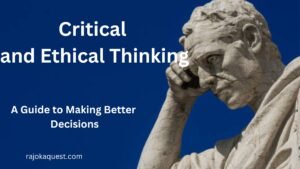Blooming Minds: Nurturing the Seeds of Creativity and Knowledge
Blooming Minds: Nurturing the Seeds of Creativity and Knowledge
Our thinking, learning, and personal development are changing along with the always-changing world. More vital than ever is the idea of “blooming minds”. It’s about developing the mind to think creatively, solve issues, and invent rather than only about learning facts. The concept is to create a garden in our brains where concepts could blossom into something lovely using growth and development. This essay investigates the blooming mind, why it’s so essential in the modern world, and how to develop one.
What does “blowing minds” Mean?
Fundamentally, “blooming minds” is growing and supporting one’s knowledge, creativity, and cognitive skills. It’s about encouraging an attitude that’s receptive to knowledge, curious about the planet, and capable of critical thinking. This word makes us picture blossoms flowering—just as they depend on sunlight, water, and care, our brains also require excitement, challenge, and nurture to flourish.
The Importance of a Blooming Mind in Today’s World
Our fast-paced, information-rich environment calls for more than merely memorizing. It calls for adaptable, creative, critical-thinking minds. Whether your name is professional, student, or just someone negotiating life, a blossoming mind will benefit you:
Change in Technology and Society
Changing Quickly: Being a fast thinker is vital. When confronted with fresh difficulties, a growing mind is nimble and can pivot fast, which helps to keep relevant and productive.
Solve Difficult Problems: Challenges abound in daily life and employment. A blossoming mind has the tools needed to come up with original answers. Solving problems requires a combination of analytical thinking and imagination—two qualities defining a blossoming intellect.
Innovate: Success in business, science, or the arts depends on innovation. New thoughts and discoveries find their home in blossoming brains. Seeing connections others might overlook often sparks creativity; a well-nurtured mind is skilled at making these connections.
Enhance emotional Intelligence: Personal and professional interactions depend on a knowledge of and control over emotions. A well-cared-for mind is more sensitive to these facets. Emotional intelligence consists of empathy, self-awareness, and social skills—all of which are absolutely vital for negotiating the complexity of human contacts.
Cultivating a Blooming Mind: Practical Steps
1. Encourage Curiosity and Lifelong Learning
It motivates us to investigate, probe questions, and hunt fresh information. Encouragement of curiosity helps you to keep your intellect busy and involved. One could accomplish this by:
Reading Widely: Reading broadly is not confining yourself to one genre or issue. Look at fiction, nonfiction, science, history, and more. Every book opens another door, leading to many points of view and thoughts. Books are windows into many worlds; reading widely lets you view the world from several sides.
Asking Questions: Inquiring Questions Take nothing at face value. Find why, how, and what if. Learning and knowing the world depend on questioning fundamentally. Inquiry results in discovery; curiosity drives the other way. Your awareness will grow more profound the more questions you ask.
2. Engage in Creative Activities
One muscle that requires consistent workouts is creativity. Participating in creative pursuits can enable your intellect to blossom by:
Trying New Hobbies: Pursuing a new hobby—painting, writing, music, cooking, or anything else—can inspire innovation. These pursuits test the brain and inspire fresh approaches to thinking. Creativity is about handling challenges and chores in fresh and inventive ways, not only about producing artwork.
Problems Solving Games: Your creativity and problem-solving ability can improve with puzzles, strategy games, and even some video games. These games typically call on you to examine many possibilities, think several steps ahead, and make decisions based on scant knowledge—all valuable abilities.
3. Develop Critical Thinking Skills
Critical thinking is the capacity to produce a logical assessment by objectively analysing data. It’s about becoming an engaged student instead of a passive knowledge absorber. To improve analytical skills:
Analyze Different Perspectives: Exude other viewpoints instead of depending on one. Examining problems from several angles helps one to have a more complete picture. In a world growing more linked by the day, when seeing things from several viewpoints is a valuable ability, understanding many points of view is vital.
Reflect Regularly: Think often, reflecting. Spend some time considering your choices, values, and the knowledge you come across. Reflecting allows one to grasp the justification for their ideas and behaviour. Thinking back on events and concepts helps to organize knowledge and advances a closer comprehension of the content.
4. Stay Open-Minded
Being open-minded is the ability to let fresh data cause you to rethink your opinion. It’s about not rigorously adhering to one point of view and instead being flexible in your thoughts. An open mind presents a rich ground for development:
Embrace New Ideas: Accept new ideas even if they contradict your present views. Growth often results from pushing past your comfort zone. Knowing that development and learning often originate from the unknown, an open mind actively searches for fresh ideas rather than only accepting them.
Interact with Diverse People: Interacting with people from all origins and cultures will help you expand your mind to fresh approaches to thinking and world interpretation. Diversity sharpens our minds by offering fresh ideas and experiences that can inspire creative responses and solutions.
5. Practice Mindfulness
Being present in the moment, totally aware of your ideas, feelings, and environment, is what mindfulness is about. It improves mental clarity, lessens stress, and sharpens attention:
Meditation: Regular meditation can help quiet the mind, increase focus, and boost cognitive ability. By fostering a calm, centred, and focused frame of mind, tasks and problems become more easily approachable.
Mindful Activities: Yoga, tai chi, or just wandering in nature can help you develop mindfulness, thereby enabling you to establish a closer connection with your ideas and surroundings. Mindfulness exercises help silence the daily noise, facilitating listening to and understanding of your ideas.
6. Foster Emotional Intelligence
Emotional intelligence is the capacity for self- and others’ emotional awareness and control. It’s vital for a blossoming mind:
Self-awareness: Pay attention to your emotions, what sets them off, and how they influence your conduct. Effective emotional management depends on first being aware of them.
Empathy: Try to see events from the viewpoints of other people. This can enhance communication and help create closer bonds. Empathy makes more significant encounters and closer relationships possible.
The Role of Education in Blooming Minds
Education Systems Need to Evolve
Standardized testing and memorization are common subjects of traditional instruction. But education systems must concentrate on them if we are to help blossoming brains:
Critical Thinking and Problem Solving: Use critical thinking and problem-solving exercises to encourage kids to solve problems creatively instead of merely remembering data. Critical thinking and problem-solving are vital abilities in a society that prizes creativity and adaptation.
Project-Based Learning: Through real-world projects, students can apply what they have acquired in a useful manner, therefore improving their knowledge and retention. Project-based learning provides background and relevance, therefore enhancing the efficacy and enjoyment of education.
Interdisciplinary Learning: Combining disciplines such as science, art, and literature can offer a more complete education and encourage innovation and creativity. By helping students to link many spheres of knowledge, interdisciplinary learning promotes a more unified perspective of the world.
Role of Teachers and Parents
Nurturing blossoming brains mostly depends on parents and teachers. These can:
Encourage Exploration: Let youngsters pursue their passions and interests. Help them in their attempts at novel ideas, even should they fail. Encouragement of discovery helps kids find their passions and abilities, establishing the basis for lifetime learning.
Provide a Safe Environment for Questions: Let kids ask questions even if the responses aren’t easily accessible. This promotes inquiry and education. A safe place for inquiries fosters a culture of inquiry and discovery, which is necessary for a blossoming intellect.
Model Lifelong Learning: Model Constant Lifelong Learning Shows that learning never ends in the classroom. Share your hobbies and show a passion for learning by doing them. Children cherish and seek knowledge when adults show a passion for learning.
The Workplace: A Garden for Blooming Minds
Creating a Culture of Growth
Companies that support flowering brains are more creative and successful. To establish such a culture:
Encourage Learning and Development: Provide staff members with training, seminars, and opportunities to learn new skills. Constant learning opportunities help staff members stay involved, driven, and ready to tackle new problems.
Promote Collaboration: Encourage team members to cooperate, exchange ideas, and grow personally through one another. Working together helps one be creative and innovative since several points of view join in solving difficulties and producing fresh ideas.
Reward Innovation: Celebrate and thank staff members for fresh ideas and answers. Recognizing innovation motivates staff members to be creative and proactive, guiding the business.
The Role of Leadership
Developing blossoming brains inside a company depends much on the leaders. They have:
Lead by Example: Demonstrate a will for both professional and personal development. Leaders prioritising learning and development create a tone that inspires others to follow suit.
Encourage Risk-Taking: Let staff members test new ideas and take chances without concern for failure. Innovation often requires taking chances; a supportive workplace helps staff members experiment and create.
Encourage Risk-Taking: Give staff members direction and encouragement so they might advance their competencies. Mentoring offers staff members insightful direction and encouragement to help them follow their careers and reach their objectives.
Conclusion
Personal fulfilment, development of society, and expanding knowledge and invention depend on blossoming brains. By raising curiosity, creativity, critical thinking, and emotional intelligence, we can create brains that are not just capable of great things but also flexible and robust in the face of change. In the classroom, at home, or at the office, encouraging a blossoming mind is about setting the conditions where ideas may germinate, flourish, and finally blossom.
The ability to think creatively, solve issues, and learn always is priceless in a world of ongoing change. Focusing on developing our brains helps us actively shape the future rather than prepare for it. Let’s create a garden of blossoming brains where every idea might develop into something quite remarkable. Using inquiry, imagination, and critical analysis, we can help create a society that celebrates knowledge, invention, and the boundless opportunities of the human mind.
Read more, Click Here.






